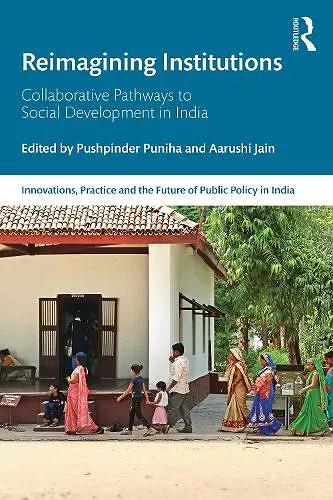Reimagining Institutions
Collaborative Pathways to Social Development in India
Aarushi Jain editor Pushpinder Puniha editor
Format:Paperback
Publisher:Taylor & Francis Ltd
Published:22nd Oct '25
Should be back in stock very soon
This paperback is available in another edition too:
- Hardback£155.00(9781041139904)

This book unpacks the complexities of social development in India, focusing on the institutional bottlenecks that hinder effective policy implementation.
While governments and organizations design ambitious policies for economic growth, human capital development, education, agriculture, and social welfare, their impact is often diluted due to governance inefficiencies, bureaucratic inertia, and weak last-mile service delivery. Through a blend of empirical and evidence-based research, policy analysis, and real-world case studies, the book provides a comprehensive understanding of the mechanisms that drive – or obstruct – sustainable development in India. It explores pressing socio-economic issues, such as demographic shifts, sustainable futures, workforce dynamics, digital governance, e-markets, bureaucracy, and gender-based violence. The book serves as a vital resource for those seeking to understand governance challenges and the institutional reforms necessary for meaningful change. By highlighting both the problems and potential solutions, it fosters a dialogue on creating resilient and inclusive institutions that can effectively deliver on their promise of social progress.
Part of the Innovations, Practice and the Future of Public Policy in India series, this volume will be of interest to policymakers, policy practitioners, researchers, development practitioners, and engaged citizens, particularly as we move towards a tech-savvy public sector. It will be an essential resource for students and researchers of development studies, sociology, public policy and governance, economics, and South Asian studies.
The Open Access version of this book, available at http://www.taylorfrancis.com, has been made available under a Creative Commons [Attribution-Non Commercial-No Derivatives (CC BY-NC-ND)] 4.0 license.
‘These volumes fill a unique niche in the continuum between academic research and advocacy. They go beyond merely identifying challenges in various aspects of human development, particularly health, nutrition, and education, and instead explore potential solutions through critical reviews of what works. This makes the collection immensely valuable to both academicians and practitioners, rendering these volumes essential reading for anyone interested in public policy.’
Sonalde Desai, Professor, National Council of Applied Economic Research and University of Maryland, USA.
‘Human development cannot be viewed segmentally through a reductionist lens, since the various elements are closely integrated and impact each other. Health is inseparable from nutrition, and both are influenced by education, environment and economic development. In each of these, equity is the litmus test of development serving its social purpose. These six volumes knit these varied skeins into a unified tapestry of human development. While detailing the key components of each of the main themes, the composite collection connects them to create a coherent design for accelerated and equitable people centric human development in India.’
K. Srinath Reddy, Founder (Past) President,Public Health Foundation of India
‘These volumes compile the results of many micro studies in the areas of health, nutrition, education and rural livelihood development. These are critical areas where India needs to improve performance to achieve the objective of Viksit Bharat. Larger funding is unavoidable but even more important is to ensure efficiency of spending and it is here that these micro studies will provide evidence-based guidance in what works and in what circumstances. The solutions will not be the same across all states and this must be built into the design of each programme at the state level. The collection is an invaluable contribution in this very important area.’
Montek Singh Ahluwalia, Ex–Deputy Chairman, Planning Commission of India
‘Do institutions determine the trajectory of social development in a large, pluralistic, diverse, participatory democracy like India? Do they facilitate or hinder inclusive, equitable and accountable social transformation? Has the institution of the District Collector, which is more than two and a half centuries old, become dysfunctional? Is it afflicted by a syndrome akin to Baumol's Cost Disease, with productivity improvements of the institution substantially lagging behind the rising expectations for delivery of quality public services? Can this legacy institution be reformed and revamped to bridge the widening gap between the ever-increasing responsibilities and diminishing authority, and ensure outcome-focused 'good governance'? What makes the “Kudumbashree” programme in Kerala so overwhelmingly successful in delivering collaborative governance? These are some of the questions, of immense interest to the practitioners of public policy as well as academic researchers, which have been addressed in this volume - Reimagining Institutions: Collaborative Pathways to Social Development in India. The book, consisting of seventeen chapters, authored by experienced administrators and eminent scholars, has explored how collaborative institutions have delivered tangible success in improving livelihoods and human development.’
Jugal Mohapatra, Former Secretary, Rural Development, Government of India
ISBN: 9781041144007
Dimensions: unknown
Weight: 890g
450 pages